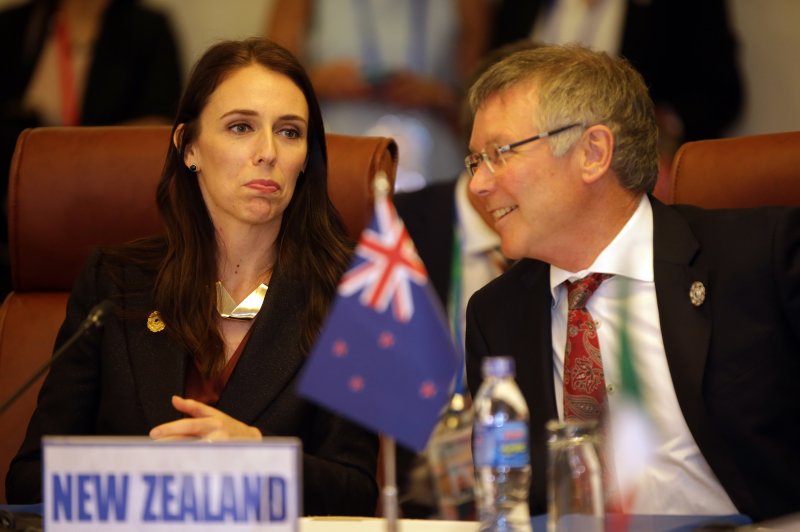New Zealand's Prime Minister Jacinda Ardern talks with Trade and Export Growth Minister David Parkerat during the Trans-Pacific Partnership meeting held on the sidelines of the 25th Asia-Pacific Economic Cooperation summit in Danang, Vietnam. Photo by Na Son Nguyen/pool/EPA
Nov. 11 (UPI) -- Pacific Rim partners, meeting without the United States, reached a new trade deal Saturday in Danang, Vietnam.
The remaining 11 trade ministers of the Trans-Pacific Partnership approved a trade agreement, which each country still needs to sign and ratify. The group was renamed the Comprehensive and Progressive Agreement for Trans-Pacific Partnership after U.S. President Donald Trump pulled out of the world economic order.
"Ministers are pleased to announce that they have agreed on the core elements of the Comprehensive and Progressive Agreement for Trans-Pacific Partnership," the 11 nations said in a statement.
The TPP was formed in February 2016 and spearheaded by former President Barack Obama to expand corporations' international markets and theoretically drive down costs for consumers and businesses.
The remaining countries are Japan, Australia, Canada, Mexico, Singapore, Malaysia, Vietnam, Chile, Peru, New Zealand and Brunei.
The agreement will "serve as a foundation for building a broader free-trade area" across Asia, Taro Kono, Japan's foreign minister, said in a statement.
In the deal, members would have tariff-free trade with one another. The nations hope the agreement will open markets specifically for agricultural products and digital services. In addition, it will help increase protections for intellectual property in some countries.
"We are pleased that progress is being made towards a possible agreement, but there is still some work to be done," François-Philippe Champagne, Canada's minister of international trade, said in a statement.
World leaders also were meeting in Vietnam at the Asia-Pacific Economic Cooperation Summit.
Trump, in a speech Friday to APEC business executives, reiterated his opposition to multinational trade agreements but said he is willing to negotiate with any country for one-on-one trade deals.
"At some point, the administration may begin to see that this was a strategic mistake and that dropping out of trade is not in the interest of American workers," Rufus Yerxa, president of the National Foreign Trade Council, a lobbying group that represents companies like Walmart, Ford and Microsoft, told the The New York Times.















